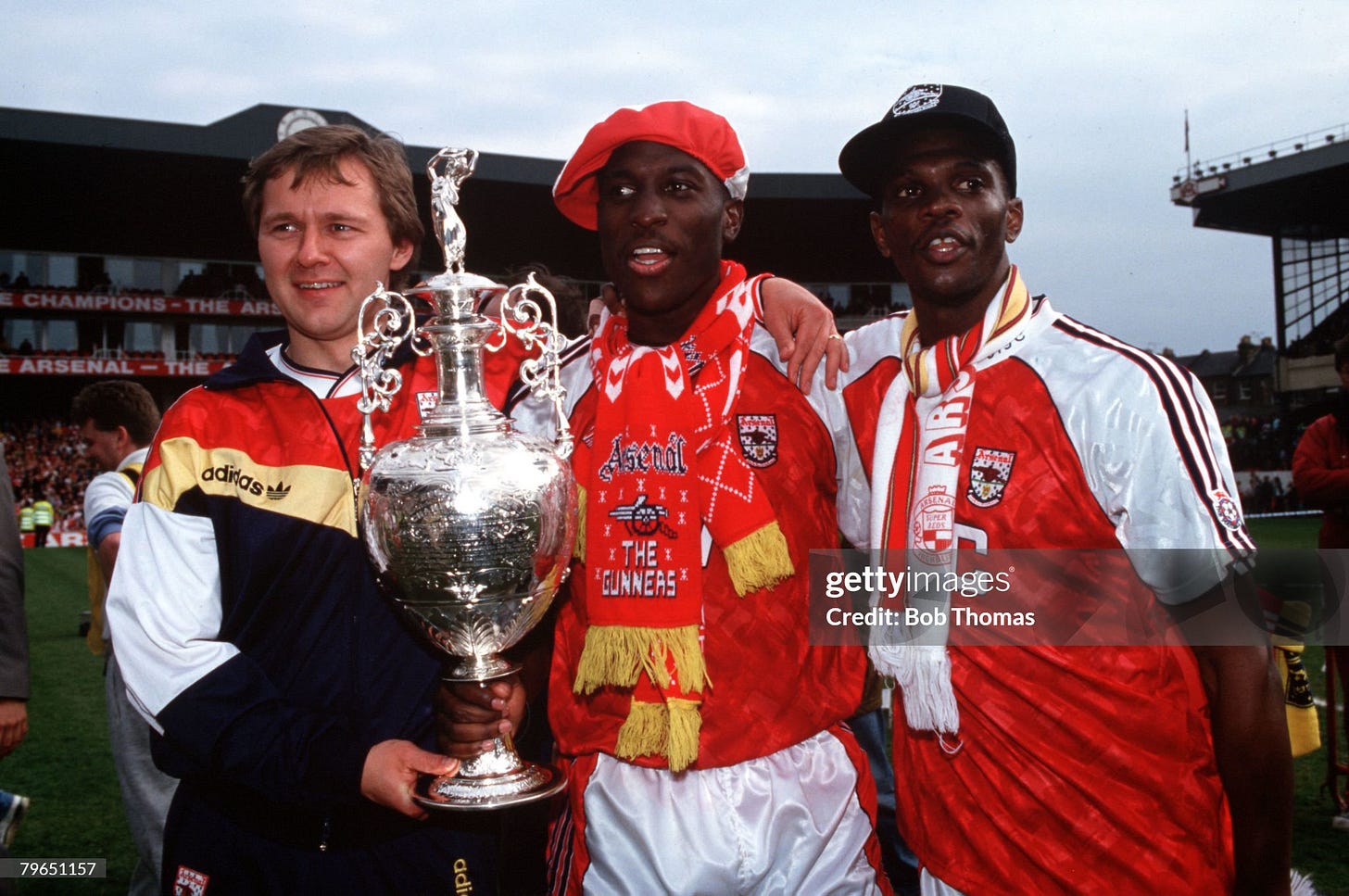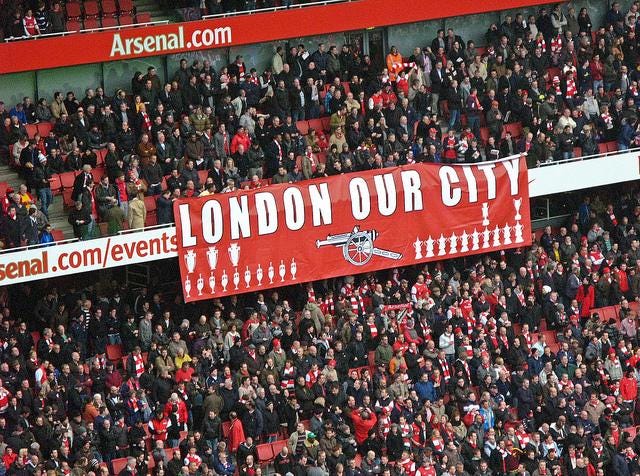Kings of London: Ultimate Edition (part two)
Carrying on the story of which teams dominated the capital over the years - and who are the ultimate Kings of London.
The 1970s
Arsenal were Kings of London six times out of nine in the 1970s (there were only three London clubs in the First Division in 1979-80), firmly establishing the Gunners as the premier side in the capital.
Queens Park Rangers were promoted to the First Division in 1972-73, and in their first season at the top table finished higher than any other London side. They were unbeaten in eight derbies, winning them their first - and still only - Kings of London crown.

This is despite QPR missing out on winning the league by just a point in 1975-76.1 Rangers may have looked back ruefully at a 2-0 defeat at Highbury in December 1975 as the points lost that could have seen them crowned champions.
The 1980s
This period saw London teams literally rise to the top. From just three capital-based clubs in 1979-80, a decade later there were eight:
Arsenal
Charlton Athletic
Chelsea
Crystal Palace
Millwall
Queens Park Rangers
Tottenham Hotspur
Wimbledon
This prompted Arsenal midfield Kevin Richardson to remark:
“With seven London clubs in the First Division, there are so many matches with an extra edge to them. There’s a lot of pride at stake, particularly for the smaller clubs, who derive great satisfaction from beating us or Tottenham…
“But that means clubs in the capital are cutting each other up, which is a big obstacle for a London team with title hopes.”
(From ‘Local clashes pump up the pressure’, article by Kevin Connolly in Arsenal matchday programme for the First Division match versus Wimbledon, 17 May 1989)
By the time the 1990s dawned, Arsenal were comfortably on top.
Arsenal (12)
Tottenham Hotspur (8)
Chelsea, West Ham United (7)
Brentford (3)
Queens Park Rangers (2)
Charlton Athletic, Wimbledon (1)

The Premier League - the early years
For the first Premier League season in 1992-93, there were six London clubs: Arsenal, Chelsea, Crystal Palace, QPR, Spurs and Wimbledon.
As Manchester United stormed to their first Premier League title, it was QPR who gave the capital’s best showing, ultimately finishing fifth. However, Rangers only won two of their 10 derbies. Instead, it was Chelsea that took the Kings of London crown, with 19 points from derbies.
Arsenal finished with the best derby record in 1993-94, the same season the Gunners won the European Cup Winners’ Cup, with QPR and Spurs taking the crown the next two seasons.
Then, entre un certain Frenchman.

Between 1996-97 and 1999-2000, Arsène Wenger’s Arsenal accrued 74 points from London derbies from a possible 108, winning 21 of 36.
The 1997-98 double-winning season saw Arsenal go undefeated in London derbies, winning six and drawing four. (The Gunners also played another seven derbies in the cups, with both Crystal Palace and West Ham taking Arsenal to replays in the FA Cup.)
By the turn of the century, London was undoubtedly red.
Arsenal (19)
Tottenham Hotspur (9)
Chelsea (8)
West Ham United (7)
Brentford, Queens Park Rangers (3)
Charlton Athletic, Wimbledon (1)
21st century Kings
Arsenal, Chelsea and Tottenham are comfortably established in the Premier League. Since the turn of the century, six other London clubs have featured in the top division but almost all of them have tasted relegation at one point or another.
Arsenal’s battle with Manchester United at the summit of the league meant the Gunners dominated derbies in the early 2000s. This included an unbeaten run that lasted from 2001 to 2005.
Charlton Athletic won a remarkable see-saw derby at Highbury 4-2 on 4 November 2001. This was Arsenal’s only derby defeat of the season as the Gunners stormed to the league championship.
Arsène Wenger’s side next tasted a league derby defeat on 28 August 2005, going down 1-0 to Chelsea at Stamford Bridge. By my count, that is 35 derbies without defeat - a run that included this Thierry Henry masterpiece.
The Roman Abramovich era at Chelsea brought (bought?) massive success to the club and saw the Blues dominate derby days, too. They were the top London team in 2005-06, 2006-07 and 2009-10, and another four times in the 2010s.
Chelsea didn’t have it all their own way through that decade, however. Spurs took three Kings of London crowns while Arsenal managed two.
The madness of the 2015-16 season that saw Leicester City win the Premier League also brought a surprise in London as West Ham had the best derby record. The Hammers lost just one of eight games, accruing 15 points.
Arsenal, meanwhile, won only one London derby (2-1 away to Crystal Palace in August). The Gunners finished second, 10 points behind Leicester - a gap that could have been bridged with a few derby wins.
(Spurs, meanwhile, famously finished third in a two-horse race after being walloped 5-1 by Newcastle United on the final day.2 Their championship hopes were undone by a chaotic 2-2 draw with Chelsea on 2 May 2016.)

Arteta’s Arsenal
Mikel Arteta’s first London derby was a narrow 2-1 defeat to Chelsea at the Emirates Stadium on 29 December 2019. Since then, the Arsenal boss has a 59% win rate in derbies.

The last two seasons have seen the Gunners win 17 of 24 derbies, a 71% win rate. This brings Arsenal’s Kings of London title count to 29, an astonishing demonstration of dominance, particularly over the past 40 years.
In short, Arsenal are undoubtedly the Ultimate Kings of London.

The race was so close that, ahead of the final round of matches, the Daily Mirror reported that a 1-0 win for QPR over Leeds United and a 3-3 draw between Liverpool and Wolverhampton Wanderers would have put the sides exactly equal - meaning a one-off title decider, potentially at Wembley Stadium.
As it happened, QPR won 2-0 on 24 April 1976, but had to wait for Liverpool’s last game on 4 May to know whether they would finish the season as champions. Liverpool beat Wolves 3-1 at Molineux to win their ninth First Division championship.
Amusingly, at least for non-Spurs fans, the defeat came despite Newcastle having a player sent off on 61 minutes with the score at 2-1. Oh, and Newcastle were relegated. Happy St Totteringham’s Day.




